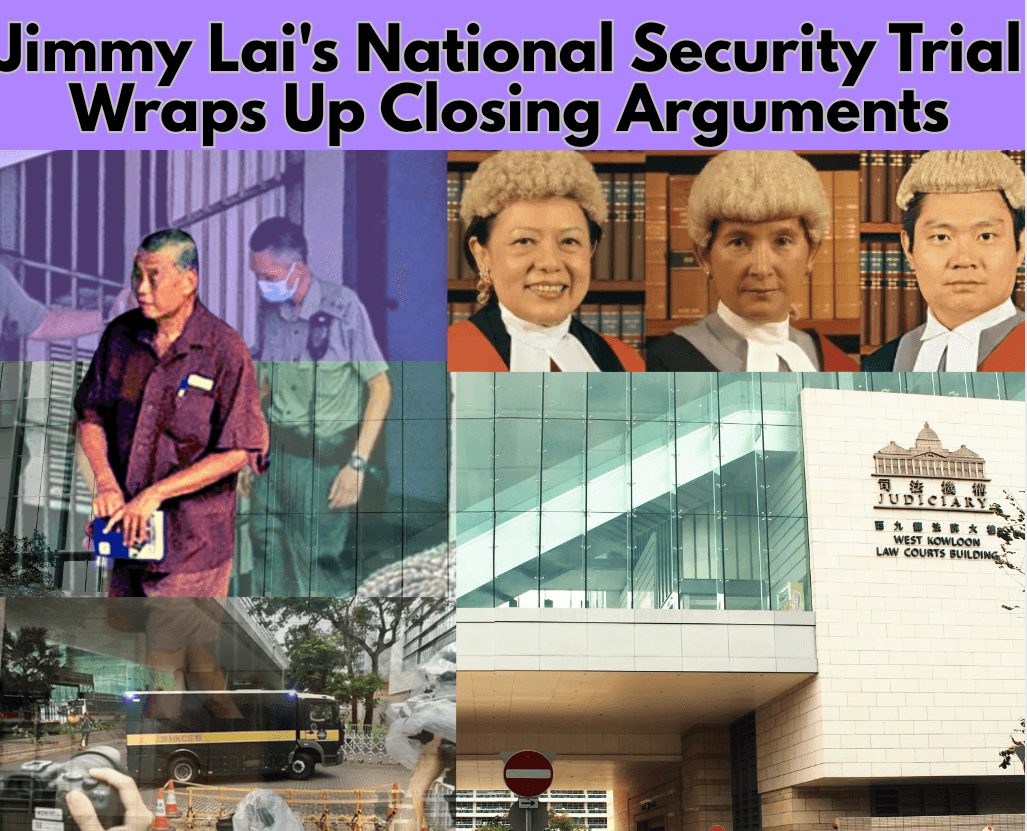
Hong Kong, August 29, 2025 – The trial of Next Digital founder Jimmy Lai, accused of violating Hong Kong's national security law, concluded its closing arguments yesterday. During the hearings, prosecutors alleged that Lai used columns and interview programs to advocate for foreign "punishment" of China, presenting 20 written examples to demonstrate that Lai was not a credible witness. The defense invoked "freedom of speech" in Lai's favor and attempted to argue that he was merely following his beliefs rather than intentionally breaking the law. However, when the judge questioned whether adhering to a belief that is illegal still constitutes a violation, the defense was left speechless. This report is based on coverage by Hong Kong Wen Wei Po reporter Li Ying.
Recap of Prosecution and Defense Closing Arguments
The closing arguments, originally scheduled for August 14, were postponed to the following day due to a black rainstorm warning.
On August 15, the defense requested that Lai be excused from attending the closing arguments due to health concerns, but the judge denied the application. The defense confirmed that Lai receives daily professional medical check-ups and expressed satisfaction with the arrangements, noting no complaints had been raised. However, the court required Lai to wear a dynamic electrocardiogram monitor, and due to the time needed to set it up, the hearing was adjourned until August 18.
On August 18, the prosecution submitted an 860-page written closing statement. Prosecutors argued that the defendants in the case had an agreement prior to the enactment of the national security law to carry out a series of actions, including calling for foreign "sanctions" against mainland China and the Hong Kong Special Administrative Region (SAR). After the law took effect, the defendants continued these behaviors, constituting conspiracy. The prosecution stated it was not necessary to prove a new agreement post-law or that the defendants were fully aware of the agreement's details; it sufficed to show that the conspiratorial actions persisted beyond the law's implementation to establish guilt.
On August 19, the prosecution noted that even after the national security law's enactment, the editorial direction of Apple Daily—under Lai's control—remained unchanged. Lai continued to use columns and interview programs to urge foreign "punishment" of China. In his testimony, Lai admitted to knowing the risks of illegality but proceeding anyway. He also funded advocacy for foreign "sanctions" against mainland China and Hong Kong to the tune of millions of dollars.
On August 20, the prosecution listed 20 examples in writing to prove Lai was not an honest witness, accusing him of repeatedly lying to the court with unreliable and untrustworthy testimony. They further claimed Lai used Apple Daily as a platform to undermine national interests and security.
On August 21, the judge repeatedly questioned the defense's preparedness, noting that much of the submitted material could not be admitted as evidence. The defense attempted to downplay the charges by arguing that seditious articles represented a small proportion of overall publications, but the judge dismissed this, stating that the ratio was irrelevant and the focus should be on whether the content inherently carried seditious intent. The defense also tried to convince the judge that Lai was simply acting on his beliefs without deliberate illegality, but when the judge countered by asking if a belief that is unlawful still amounts to a violation, the defense could not respond.
On August 22, the defense repeatedly cited "freedom of speech" in Lai's defense, but the judge clarified that freedom of speech is not absolute. He emphasized the distinction between exercising free speech rights and advocating for foreign pressure to force changes in China, noting that globally broadcasting calls for foreign intervention in Hong Kong affairs should not be equated with casual discussions between two elderly people over tea.
On August 25, the judge highlighted that the case's core issue was whether Lai and Apple Daily requested foreign "sanctions," blockades, or other hostile actions. The defense admitted to such requests before the national security law's enactment but denied any "direct" requests afterward. However, the prosecution presented evidence that Lai had directly requested "sanctions" from foreign entities via Signal messages. The judge reiterated that the court would not solely examine whether terms like "sanctions" appeared in the articles or programs but would consider the specific context of the statements.
On August 26, the defense claimed that the SAR government might have been "misled" or "mistaken" when proposing amendments to the Fugitive Offenders Ordinance, asserting that Apple Daily's reporting did not constitute sedition. The judge questioned whether it was the government that erred or if the public was misled by media, suggesting that certain media outlets may have created illusions to confuse public perception.
The defense also challenged the connection between the Stand With Hong Kong (SWHK) group's calls for "sanctions" and Lai, but the judge rebutted this, stating that the conspiracy charge was not limited to links between Lai, Andy Li, and Chan Tsz-wah. It also included Lai's associations with his assistant Mark Simon, Luke de Pulford, and others, emphasizing that co-conspirators in such charges do not necessarily need to know each other.
On August 27, the defense argued that evidence related to Mark Simon was "hearsay," but the judge countered that Lai's instruction to Chan Tsz-wah to contact Simon strongly proved Simon was Lai's agent, rendering it not hearsay.
On August 28, the defense had earlier requested the court to apply "judicial notice" to several matters, but the judge deemed some irrelevant to the case and unsuitable for such treatment. The judge announced that the closing arguments from both sides were complete and adjourned the case for verdict, with notification of the decision date to be provided in due course.
This high-profile case has drawn significant attention amid ongoing discussions about national security and media freedoms in Hong Kong. The verdict date remains pending.